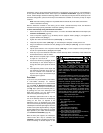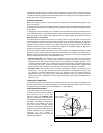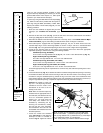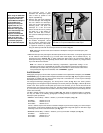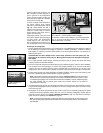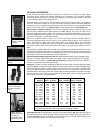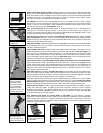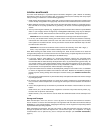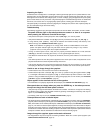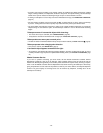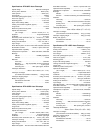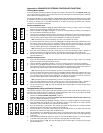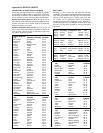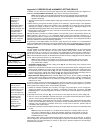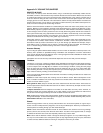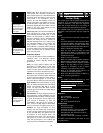
- 23 -
Inspecting the Optics
A Note About the “Flashlight Test:" If a flashlight or other high-intensity light source is pointed down the main
telescope tube, the view (depending upon the observer’s line of sight and the angle of the light) may reveal
what appear to be scratches, dark or bright spots, or uneven coatings, giving the appearance of poor quality
optics. These effects are only seen when a high intensity light is transmitted through lenses or reflected off
the mirrors, and can be seen on any high-quality optical system, including giant research telescopes.
The optical quality of a telescope cannot be judged by the “flashlight” test; the true test of optical quality can
only be conducted through careful star testing.
Troubleshooting
The following suggestions may be helpful with operation of the ETX-90EC, ETX-105EC, and ETX-125EC.
The power indicator light on the telescope does not come on or there is no response
when pressing the Electronic Controller Arrow keys:
• Verify that the Computer Control panel power switch (10A, Fig. 1) is in the ON position.
• Verify that the Electronic Controller cord (4, Fig. 3) is firmly connected to the HBX port (10C, Fig. 1).
• If using internal power (batteries), verify that the batteries are installed correctly and that they have
sufficient charge (see ASSEMBLY INSTRUCTIONS, page 9).
Note: If the batteries are getting low on charge, there will be a marked difference in the slew
speed. The speed indicator lights may also flash and the speed may change. If any of these
symptoms occurs, turn the power off and replace the batteries.
• If using an external power source, verify that it is properly connected between the 12-volt connector
(10D, Fig. 1) and either a wall plug (AC source) or a car cigarette lighter (DC source).
• If the
Electronic Controller
does not respond to commands, move the power switch to OFF and then back
to
ON
.
• If the telescope does not slew after power is applied or if the motor quits or stalls, verify that there are no
physical obstructions that would impede telescope movement.
• If all physical obstacles are removed and the telescope still does not move properly, turn off the power
and unplug the Electronic Controller. Plug the Electronic Controller back in and turn the power back on.
Unable to see an image through the eyepiece:
• Confirm that the lens cover has been removed from the telescope.
• Confirm that the flip-mirror control (14, Fig. 1) is in the “up” position if using the eyepiece holder (4, Fig.
1) so that light is directed to the eyepiece (1, Fig. 1). Confirm that the flip-mirror control is in the “down”
position if using the #932 Erecting Prism or doing photography with an ETX model (see TELESCOPE
CONTROLS, page 6 and PHOTOGRAPHY, page 18).
Object appears in the viewfinder but not in the eyepiece:
• The viewfinder is not properly aligned with the telescope (see ALIGNING THE VIEWFINDER
,
page 10).
Slew speed does not change when you press the SPEED key, or the telescope moves
slowly even though the fast slew speed is chosen:
• Verify that only one light is illuminated on the Electronic Controller. If more than one light is on or blinking,
the Mode function is active. Exit the Mode function by pressing and holding the MODE key until only one
light is on (see APPENDIX A, page 26).
• The battery power may be low (see ASSEMBLY INSTRUCTIONS, page 9).
Telescope does not track a celestial object:
• The telescope tracks celestial objects automatically only if it is placed in the polar mode (see APPENDIX A,
page 26) and the telescope is polar aligned (see POLAR ALIGNMENT, page 16) using the #880 (ETX-90EC),
#881 (ETX-105EC or ETX-125EC) Table Tripod, or #883 Deluxe Field Tripod (see OPTIONAL ACCESSORIES,
page 21). The more accurate the polar alignment, the longer the telescope’s motor drive holds an object in
the field of view of the eyepiece. If using the Alt/Az mode, track celestial objects by using the Arrow keys on
the Electronic Controller. Automatic tracking of objects in the Alt/Az mode requires the optional #497 Autostar
Computer Controller. Also the Horizontal and Vertical locks must be locked (page 6).
Images through the eyepiece appear unfocused or distorted:
• The magnification may be too high for the viewing conditions. Back off to a lower power eyepiece (see
UNDERSTANDING MAGNIFICATION, page 12).



